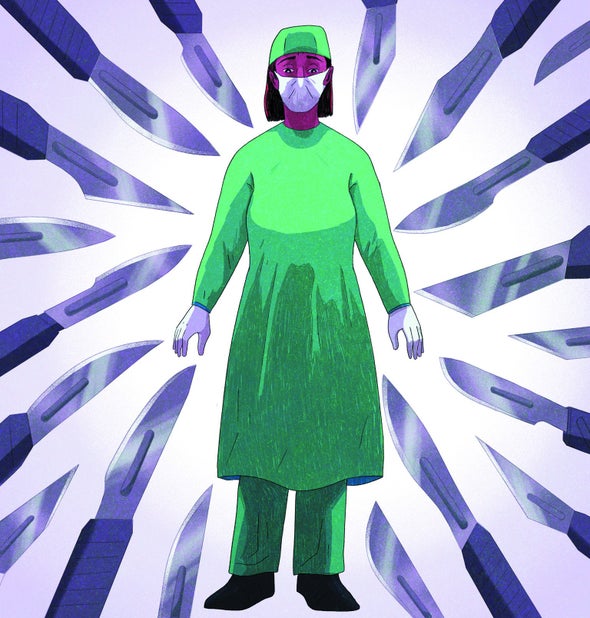As a male surgeon, I am mortified that the profession allows my female colleagues to be treated like second-class citizens. I have watched women surgeons get bullied, harassed and discriminated against by their male counterparts. I have seen a countless number of their careers crumble in front of my eyes. I have seen their tears. I have seen them go into a deep hole of depression and never come back. And I'm embarrassed to say that for a long time, I did nothing about it.
New research is shining light onto the pervasiveness of sexual harassment, intimidation and prejudice in our world of surgery—but this is something that doctors have known about for decades. It is deeply ingrained in our culture of medicine—and it needs to change. While the rest of the world seems to be embracing the #MeToo movement, we are running from it. As a result, most cases of abuse are going unaddressed. And this is leading to burnout and suicidal thoughts among surgeons.
It's also bad for patients. When a person places one's life in the hands of a surgeon, one assumes that she or he is singularly focused on the patient's well-being. But how can surgeons perform at their best if they are battling workplace abuse?
Like many male surgeons, I have been afraid to speak up out of fear that it would destroy my reputation among senior surgeons in power, who are more often than not men. I am not alone. “Men are bystanders. They know something is wrong. They know someone is taking advantage of the situation. But medical training is hierarchical, and most men find it hard to challenge someone with more authority,” says Zeno Franco, associate professor at the Medical College of Wisconsin. And frankly, many male surgeons don't care enough to do so.
A study in the New England Journal of Medicine shows that about a third of surgical trainees in the U.S. experience gender discrimination or verbal and physical abuse. Nearly two thirds of female surgeons-in-training experience gender discrimination, and one in five is sexually harassed—often by senior supervising surgeons. Another survey showed that 58 percent of U.S. women surgeons experienced sexual harassment within the last year, and many incidents were not reported. The most common reason: “fear of a negative impact on my career.”
Discrimination and abuse are daily occurrences for many women surgeons; the perpetrators include co-workers, patients and their families, and nurses, says Arghavan Salles, scholar in residence at the Stanford University School of Medicine. “This is an epidemic,” she says. “Not just one bad actor.” Because women are scarce in academic surgery, says Karyn Butler, a professor of surgery at the Sidney Kimmel Medical College of Thomas Jefferson University, “they are the minority trying to convince the majority. And getting ahead is based on reputation among colleagues, making it easy for one's career to be destroyed for speaking out. To avoid sexual harassment at work, she notes, many women surgeons have resorted to demeaning ground rules, like “always wear a shirt under your scrubs, or else male surgeons will look down at your chest.”
Men must acknowledge that discrimination and harassment in surgery are a problem, Butler says, and they need to step up. When we witness gender abuse, we need to support the victim and call out our colleagues or make sure that leadership is doing something about it. When we see great ideas from women surgeons being discounted or undeservingly credited to men, we can redirect the conversation. We can implore our institutions to hire and promote equitably. We can demand that they acknowledge maternity rights.
I myself have started raising these issues with my male colleagues. Some think the problem is overblown, and a few are outraged. But I've been gratified to see that many are supportive of these efforts. We have had a number of conversations around the topic, and most have been highly productive, with women feeling comfortable sharing their stories of abuse. I urge surgeons at other institutions to begin talking as well. They may fear that their careers could be at risk, but our female colleagues wouldn't hesitate to stick their necks out for us. Let's show them that they are not alone.


